What's Happening?
Fleet managers are increasingly relying on smarter maintenance strategies to cope with a downturn in truck orders. According to ACT Research, Class 8 orders have decreased by 44% year-over-year, while medium-duty Classes 5-7 orders are down by 22%. In response, fleets are turning to the used truck market and optimizing maintenance schedules to extend the life cycles of aging trucks. This involves a proactive, data-driven approach to maintenance, including preventive and predictive maintenance strategies. Fleet managers are leveraging telematics and real-time vehicle data to anticipate potential failures and avoid costly breakdowns.
Why It's Important?
The decline in truck orders signifies challenges in the commercial vehicle industry, prompting fleets to maximize the utility of existing assets. By adopting smarter maintenance practices, fleets can reduce downtime and repair costs, ensuring continued operations despite market constraints. This shift towards data-driven maintenance not only enhances fleet reliability but also supports sustainability by extending the lifespan of vehicles. As fleets adapt to these strategies, the industry may see a broader adoption of technology-driven maintenance solutions, potentially influencing future vehicle procurement and management practices.
What's Next?
As fleets continue to implement smarter maintenance strategies, there may be increased investment in telematics and predictive maintenance technologies. This could lead to partnerships with technology providers to enhance data analytics capabilities. Additionally, fleet managers may explore further optimization of maintenance schedules based on specific vehicle conditions and usage patterns. The industry may also witness a shift in focus towards training maintenance teams to effectively utilize these technologies, ensuring the successful implementation of predictive maintenance practices.
Beyond the Headlines
The emphasis on smarter maintenance reflects a broader trend towards sustainability and efficiency in the transportation sector. By extending the life cycles of trucks, fleets contribute to reducing waste and resource consumption. This approach aligns with environmental goals and may encourage other industries to adopt similar practices. Furthermore, the integration of telematics and predictive analytics in maintenance could pave the way for advancements in vehicle technology, potentially influencing future designs and manufacturing processes.









